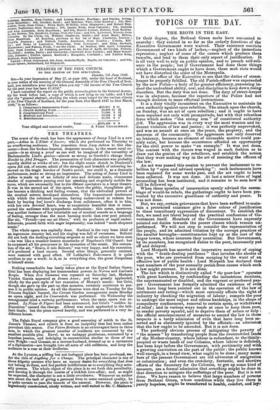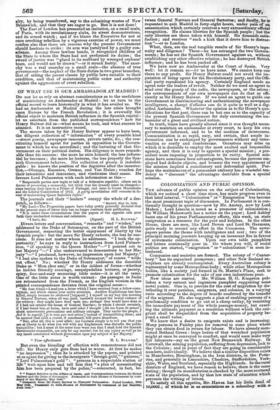TOPICS OF THE DAY.
THE RIOTS IN THE EAST.
IN their degree, the Bethnal Green mobs have amounted to anarchy : they existed in so far as the orderly functions of the Executive Government were waived. Their existence convicts Government of two kinds of laches,—neglect of the immediate repression ; neglect of some of the causes which produce these tumults, and lend to them their only aspect of justification. It is all very well to rely on public opinion, and to preach self-reli- ance in the people ; but if Government had done those things which a Government ought to have done, these mob riots would not have disturbed the order of the Metropolis. It is the office of the Executive to see that the duties of street- keeper be properly fulfilled. The old Parish-officer was superseded by the new Police—a body of far greater efficiency, possessing in- deed the undoubted ability, zeal, and discipline to keep down rising disorders. But the duty was not done. The duty of street-keeper was in abeyance, because the superiors of the Police had not enough decision to issue effectual instructions.
It is a duty vitally incumbent on the Executive to maintain its own authority against open rebellion. The attack upon the church, on Sunday, was an act of open rebellion ; and it ought to have been repulsed not only with promptitude, but with that relentless force which makes "the strong arm" of constituted authority felt. The aggression was in every way the most wanton and in- decent violation of law and justice ; it was perfectly unprovoked, and was an assault at once on the peace, the property, and the decorum of the community. The aggressors not only deserved no leniency, because no element of excusable motive could pos- sibly exist, but because the occurrence afforded an opportunity for the civil power to make "an example." It was not done. The contest with the rioters was waged in such fashion as to draw out the genius of the rebellious, and establish the notion that they were making way in the art of resisting the officers of the law.
An act was passed this session to prevent the incitement to re- bellion by "open and advised speaking" : such incitements have been repeated for some weeks past, and the act ought to have been enforced. It was not done. At last a minor form of legal proceeding has been instituted, and it remains to be seen how it will be followed up. When these apostles of insurrection openly advised the assem- blage of would-be rebels, the gatherings ought to have been pre- vented by the executive guardians of authority and peace. It was not done.
But, we say, certain grievances that have been suffered to main- tain a protracted existence give a false colour of justification to these tumultuary expressions of discontent. To establish the fact, we need not travel beyond the practical confessions of Go- vernment itself. Members of the Government have expressly pointed out duties towards the poorer classes which remain un- performed. We will not stop to consider the representation of the people, and its admitted vitiation by the corrupt practices of the smaller boroughs—constituencies kept up at the cost of the larger towns, whose interests they neutralize. But Government, by its members' has recognized duties to the poor, incessantly put off and delayed.
Lord Morpeth has asserted the imperative necessity of coping with the " death-dealing pestilence' that invades the abodes of the poor, who are prevented from escaping by the want of an effective law of public health : Lord Morpeth has declared that vast numbers of the poor annually perish from causes which such a law might prevent. It is not done.
The law which is distinctively called " the poor-law" operates with great harshness, by confounding the industrious destitute, the superannuated or disabled, and the vagrant or professed pau- per : Government has formally admitted the existence of evils that have long been pointed out in the operation of the law of settlement and rating—which most seriously affects the right of industry by checking the migration of labour ; compels the poor to undergo the most unjust and odious hardships, in the shape of compulsory confinement, removal to certain spots, or withdrawal of relief ; and in various ways tends at once to keep them poor, to render poverty squalid, and to deprive them of solace or help : the official announcement of measures to amend the law in those respects is a tardy admission of evils that have long been as- serted and as obstinately ignored by the officials—an admission that the law ought to be amended. But it is not done.
The perfectly obvious process of mitigating the poverty of "the masses" by transferring people from the overcrowded lands of the Mother-country, where labour is redundant, to the thinly- peopled or waste lands of our Colonies, where labour is deficient, has been kept before the Government, with pertinacity and with a growing conviction on the part of the public : the public knows well enough, in a broad view, what ought to be done • many mem- bers of the present Government are old advocates Of emigration or colonization; and even the crotchety, fantastic, and abortive efforts of the Secretary for the Colonies, to get up some kind of
measure, are a formal admission that something might be done in that direction to mitigate the sufferings of the poor. But it is not done. We have reason to believe that large numbers of persons from Bethnal Green, whose condition while they live there is purely hopeless, might be transferred to health, comfort, and lop'
alty, by i being transferred, say to the colonizing wastes of New Brunswick, 'and that they are eager to go. But t is not done! The East of London has presented an imitation, on a small scale, of Paris, with its revolutionary clubs, its street demonstrations, and its armed watch; and if we blame the Executive for not at once crushing rebellion by a vigorous exercise of power, we must confess also that there are reasons why the present Government should hesitate to strike : its arm was paralyzed by a guilty con- science. Among those lawless bands, it recognized children of the State to whom the State had not performed its duties ; the sword of justice was "glued to its scabbard by wronged orphans' tears, and would not be drawn"—or it struck feebly. The anar- chy was a real anarchy on a small scale—the absence of true government—the neglect of the State duties in two great branches, that of aiding the poorer classes by public laws suitable to their condition, and that of maintaining public order and authority against the aggressions of overt rebellion.



























 Previous page
Previous page